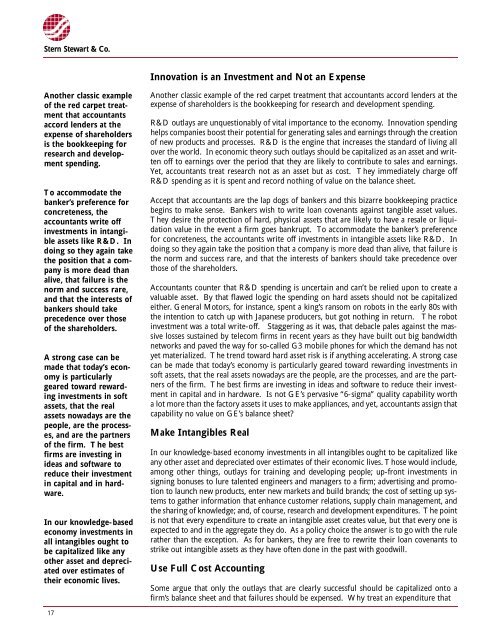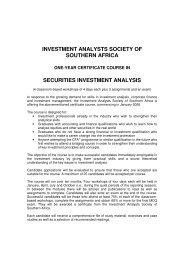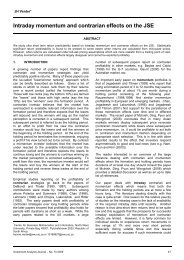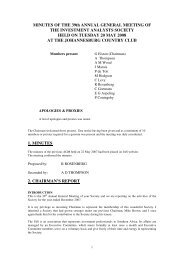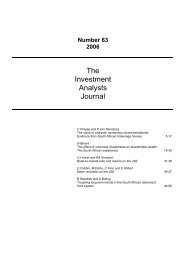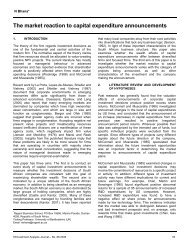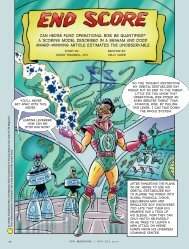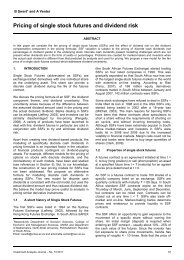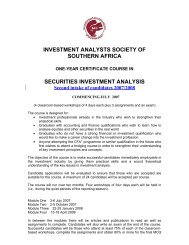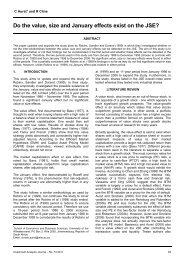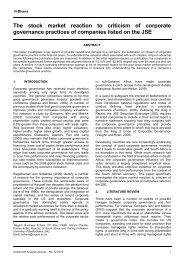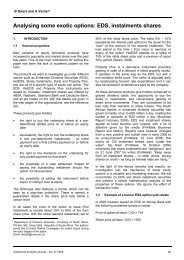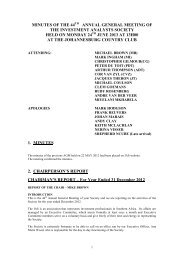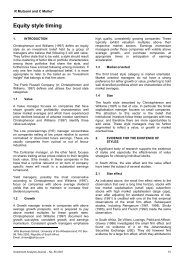Accounting is Broken - Investment Analysts Journal
Accounting is Broken - Investment Analysts Journal
Accounting is Broken - Investment Analysts Journal
Create successful ePaper yourself
Turn your PDF publications into a flip-book with our unique Google optimized e-Paper software.
Stern Stewart & Co.<br />
Innovation <strong>is</strong> an <strong>Investment</strong> and Not an Expense<br />
Another classic example<br />
of the red carpet tre a t-<br />
ment that accountants<br />
a c c o rd lenders at the<br />
expense of share h o l d e r s<br />
<strong>is</strong> the bookkeeping for<br />
re s e a rch and development<br />
spending.<br />
To accommodate the<br />
b a n k e r ’s pre f e rence for<br />
c o n c reteness, the<br />
accountants write off<br />
investments in intangible<br />
assets like R&D. In<br />
doing so they again take<br />
the position that a company<br />
<strong>is</strong> more dead than<br />
alive, that failure <strong>is</strong> the<br />
n o rm and success rare ,<br />
and that the interests of<br />
bankers should take<br />
p recedence over those<br />
of the share h o l d e r s .<br />
A strong case can be<br />
made that today’s economy<br />
<strong>is</strong> part i c u l a r l y<br />
g e a red toward re w a rding<br />
investments in soft<br />
assets, that the re a l<br />
assets nowadays are the<br />
people, are the pro c e s s-<br />
es, and are the part n e r s<br />
of the firm. The best<br />
f i rms are investing in<br />
ideas and software to<br />
reduce their investment<br />
in capital and in hardw<br />
a re .<br />
In our knowledge-based<br />
economy investments in<br />
all intangibles ought to<br />
be capitalized like any<br />
other asset and depre c i-<br />
ated over estimates of<br />
their economic lives.<br />
Another classic example of the red carpet treatment that accountants accord lenders at the<br />
expense of shareholders <strong>is</strong> the bookkeeping for re s e a rch and development spending.<br />
R&D outlays are unquestionably of vital importance to the economy. Innovation spending<br />
helps companies boost their potential for generating sales and earnings through the cre a t i o n<br />
of new products and processes. R&D <strong>is</strong> the engine that increases the standard of living all<br />
over the world. In economic theory such outlays should be capitalized as an asset and written<br />
off to earnings over the period that they are likely to contribute to sales and earn i n g s .<br />
Yet, accountants treat re s e a rch not as an asset but as cost. They immediately charge off<br />
R&D spending as it <strong>is</strong> spent and re c o rd nothing of value on the balance sheet.<br />
Accept that accountants are the lap dogs of bankers and th<strong>is</strong> bizarre bookkeeping practice<br />
begins to make sense. Bankers w<strong>is</strong>h to write loan covenants against tangible asset values.<br />
They desire the protection of hard, physical assets that are likely to have a resale or liquidation<br />
value in the event a firm goes bankrupt. To accommodate the banker’s pre f e re n c e<br />
for concreteness, the accountants write off investments in intangible assets like R&D. In<br />
doing so they again take the position that a company <strong>is</strong> more dead than alive, that failure <strong>is</strong><br />
the norm and success rare, and that the interests of bankers should take precedence over<br />
those of the share h o l d e r s .<br />
Accountants counter that R&D spending <strong>is</strong> uncertain and can’t be relied upon to create a<br />
valuable asset. By that flawed logic the spending on hard assets should not be capitalized<br />
e i t h e r. General Motors, for instance, spent a king’s ransom on robots in the early 80s with<br />
the intention to catch up with Japanese producers, but got nothing in re t u rn. The ro b o t<br />
investment was a total write-off. Staggering as it was, that debacle pales against the massive<br />
losses sustained by telecom firms in recent years as they have built out big bandwidth<br />
networks and paved the way for so-called G3 mobile phones for which the demand has not<br />
yet materialized. The trend toward hard asset r<strong>is</strong>k <strong>is</strong> if anything accelerating. A strong case<br />
can be made that today’s economy <strong>is</strong> particularly geared toward re w a rding investments in<br />
soft assets, that the real assets nowadays are the people, are the processes, and are the partners<br />
of the firm. The best firms are investing in ideas and software to reduce their investment<br />
in capital and in hard w a re. Is not GE’s pervasive “6-sigma” quality capability wort h<br />
a lot more than the factory assets it uses to make appliances, and yet, accountants assign that<br />
capability no value on GE’s balance sheet?<br />
Make Intangibles Real<br />
In our knowledge-based economy investments in all intangibles ought to be capitalized like<br />
any other asset and depreciated over estimates of their economic lives. Those would include,<br />
among other things, outlays for training and developing people; up-front investments in<br />
signing bonuses to lure talented engineers and managers to a firm; advert<strong>is</strong>ing and pro m o-<br />
tion to launch new products, enter new markets and build brands; the cost of setting up systems<br />
to gather information that enhance customer relations, supply chain management, and<br />
the sharing of knowledge; and, of course, re s e a rch and development expenditures. The point<br />
<strong>is</strong> not that every expenditure to create an intangible asset creates value, but that every one <strong>is</strong><br />
expected to and in the aggregate they do. As a policy choice the answer <strong>is</strong> to go with the ru l e<br />
rather than the exception. As for bankers, they are free to rewrite their loan covenants to<br />
strike out intangible assets as they have often done in the past with goodwill.<br />
Use Full Cost <strong>Accounting</strong><br />
Some argue that only the outlays that are clearly successful should be capitalized onto a<br />
f i rm ’s balance sheet and that failures should be expensed. Why treat an expenditure that<br />
17


